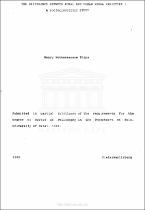The difference between rural and urban Xhosa varieties: A sociolinguistic study
Abstract
This thesis examines two interrelated issues, namely, the concept of language variety, also called linguistic diversity or linguistic variation and the difference between rural and urban Xhosa varieties in terms of standard and non-standard forms, respectively. The thesis is conceived partly against the background of the pioneer work of Labov (1966) on language variety and partly against a heterogeneous background of developments in the area of language change. The study is essentially about the nature, causes and the result of language change. Consequently, such aspects as language variety, culture, speech community, lexical borrowing, terminology and language standardization are dealt with insofar as they relate specifically to language use and language change. For purposes of the thesis, some parameters are set in terms of which the difference between rural and urban Xhosa varieties is conceived. Because the study is sociolinguistic, no detailed consideration of grammar as such is given. such aspects of grammar as are treated relate specifically to the objective of the thesis. Selected aspects of phonology, syntax and the lexicon are considered. The selection has been done on the basis of the possibility of these aspects being best suited to the kind of comparison the study undertakes. One of the expectations of a research project is that its findings, or at reast some of them, must be capable of being generalized in other areas. It is for this reason that this thesis considers some of the imprecations of the study of language varieties for language planning and language teaching.

